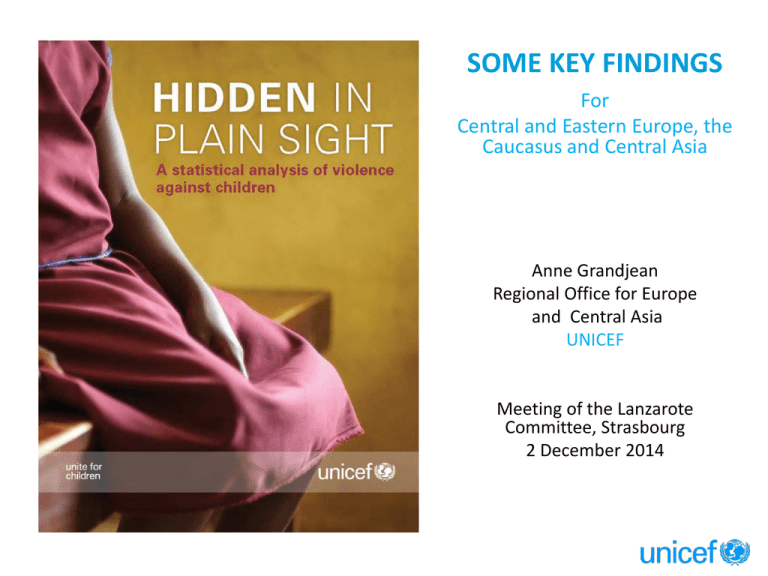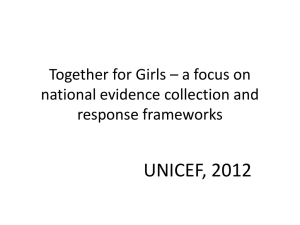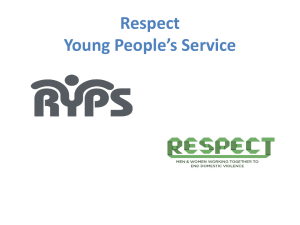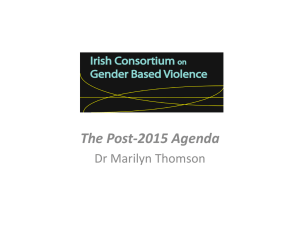
SOME KEY FINDINGS
For
Central and Eastern Europe, the
Caucasus and Central Asia
Anne Grandjean
Regional Office for Europe
and Central Asia
UNICEF
Meeting of the Lanzarote
Committee, Strasbourg
2 December 2014
Fact n. 1
The most common
form of violence
against children
occurs at home
On average, about 6 in 10 children experience some
sort of violent discipline in the home
Percentage of children aged 2 to 14 years who experienced any violent discipline,
psychological aggression or physical punishment, in the past month
100
90
80
70
60
50
40
30
20
10
0
Any violent discipline
Psychological aggression
Physical punishment
With the exception of the Republic of Moldova, less
than 5 per cent of girls report experiences of sexual abuse
Percentage of girls aged 15 to 19 years who ever experienced forced sexual intercourse
any other forced sexual acts, and percentage of girls aged 15 to 19 who experienced forc
sexual intercourse or any other forced sexual acts in the last 12 months
Republic of
Moldova
Kazakhstan
Tajikistan
Azerbaijan
Ukraine
Kyrgyzstan
0
Experienced sexual violence ever
0
Experienced sexual violence in the last
12 months
CEE/CIS
0
5
10
15
20
Additional findings on sexual violence
in selected countries with non-comparable data
• The former Yugoslav Republic of Macedonia: 6% of male and 5%
female students in grade 7 and above reported being physically forced
to have sex at some point in their lives (2007 Global School Based
Students Health Survey)
• Germany: 7% of girls and women 16 to 40 and 1% of boys and men
said they were victims before the age of 16 of sexual violence with
physical contact (2011 study).
• Italy: around 7% of survey girls and women 16 to 70 said they
experienced sexual violence by a non-partner before age 16 (2006
national survey)
• UK: around 7% of girls and 3% of boys revealed that they experienced
some form of contact sexual abuse by an adult or peer at some point
during their lives (2009 national survey of youth 11 to 17)
In most countries, less than 10 percent of adolescent girls
report incidents of physical violence
Percentage of girls aged 15 to 19 years who experienced any physical violence since
age 15 and percentage of girls aged 15 to 19 years who experienced any
physical violence in the last 12 months
Republic of Moldova
Azerbaijan
Tajikistan
Experienced physical violence since age
15
Ukraine
Kyrgyzstan
Experienced physical violence in the last
12 months
Kazakhstan
CEE/CIS
0
5
10
15
20
Fact n. 3
Most victims never
disclose their
experiences
More than half of victims never tell anyone about their experiences
of abuse nor do they seek help to end the violence
Percentage of girls aged 15 to 19 years who ever experienced physical and/or
sexual violence and never told anyone about it, and the percentage who never
sought help from any source to end the violence, in a selection of countries with
available data
100
90
80
70
60
50
40
30
20
10
0
Never told anyone
Never sought help from any source to end the violence
In Kyrgyzstan 84% and Tajikistan 75% of victims never sought help
from any source
In these two countries, over 70% of girls and women who sought
help reported that they turned to their own families.
After the victim’s own family, in-laws and/or family members of
the victim’s husband or partner were the second most commonly
reported source of support
UNICEF regional study on children’s access to justice shows that
children do not complain because:
•
•
•
•
•
They fear of being separated from their families
They think that violence is a legitimate discipline or a ‘fact of life’
They don’t know they can, and don’t know how
They fear reprisal
They think they will not be taken seriously
Fact n. 4
Condoning attitudes and
social norms place
children at risks
Around 1 in 10 adults believe that physical punishment is
necessary to raise or educate a child
Percentage of adults who think that physical punishment is necessary to
raise/educate children
Azerbaijan
Tajikistan
Republic of Moldova
Bosnia and Herzegovina
Albania
Georgia
Ukraine
Kyrgyzstan
Belarus
Kazakhstan
Serbia
Montenegro
The former Yugoslav…
Armenia
CEE/CIS
0
10
20
30
In CEECIS:
• A bit less than 30% girls
say wife-beating can be
justified
• Neglecting the children
and demonstrating
autonomy are the most
commonly cited reasons
for justifying wifebeating among both girls
and boys
• The poorest girls are
nearly four times as
likely as the richest girls
to think that wifebeating is sometimes
justifiable
6 strategies for action
1. Supporting parents, caregivers and families
2. Helping children and adolescents manage risks and
challenges
3. Changing attitudes and social norms that encourage violence
and discrimination
4. Promoting and providing support services for children
5. Implementing laws and policies that protection children
6. Carrying out data collection and research









